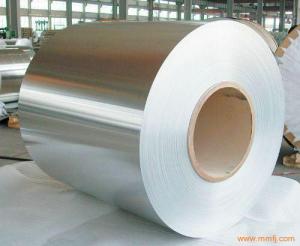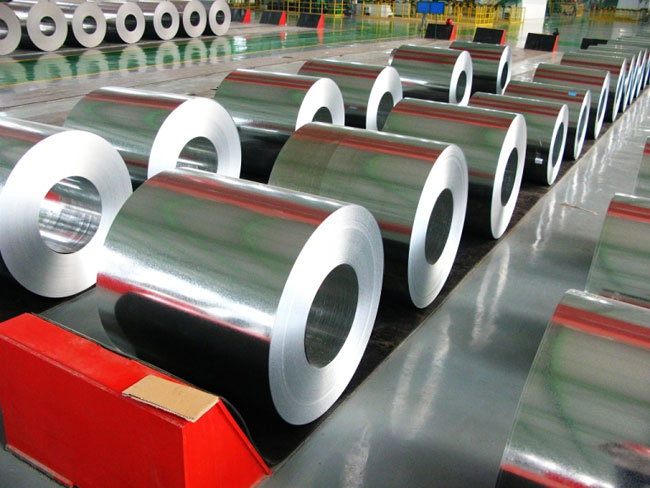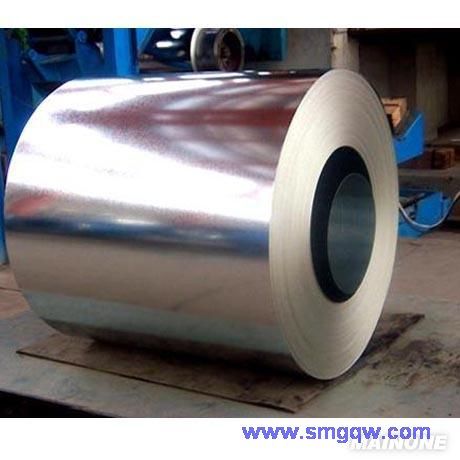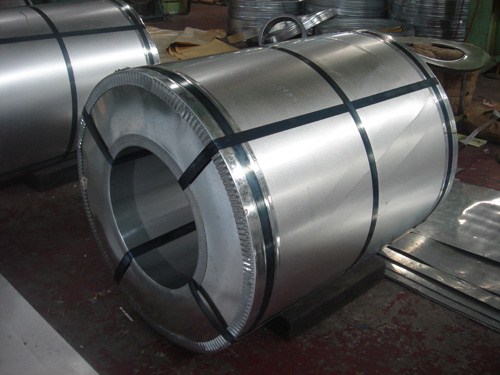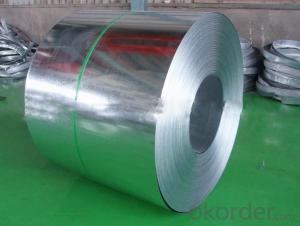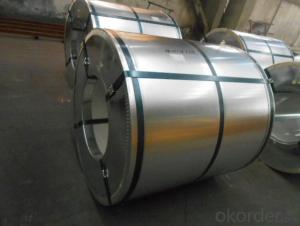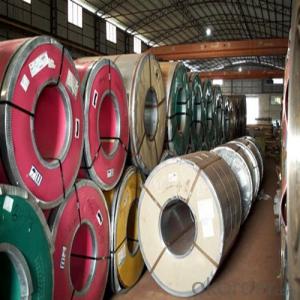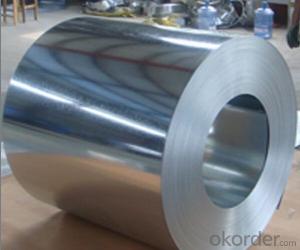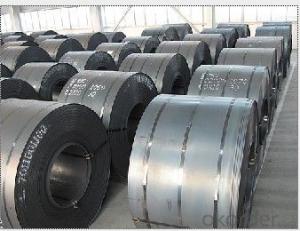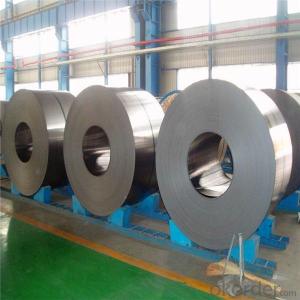HOT-DIP GALVANIZED STEEL
- Loading Port:
- Tianjin
- Payment Terms:
- TT OR LC
- Min Order Qty:
- -
- Supply Capability:
- 12000 m.t./month
OKorder Service Pledge
Quality Product, Order Online Tracking, Timely Delivery
OKorder Financial Service
Credit Rating, Credit Services, Credit Purchasing
You Might Also Like
THICKNESS:0.18mm-1.5mm
WIDTH:900mm-1250mm
COATING MASS:Z30-Z275
SPANGLE:Regular Spangle,Minimized Spangle,Zero Spangle
SURFACE TREATMENT:N0on or Chromated,Non or Oiled,Non or Anti Finger Print
COIL INNER DIAMETER:508mm/610mm
COIL WEIGHT:3mt-7mt
- Q: How does coil slitting work?
- Coil slitting is a process used to cut large coils of material, such as metal or plastic, into narrower strips. It involves feeding the coil through a set of rotating circular blades that make longitudinal cuts along the length of the coil. The blades are set at predetermined widths to achieve the desired strip thickness. The process is usually automated and ensures efficient and precise cutting, resulting in multiple narrower coils that can be used for various industrial applications.
- Q: I want to make an object out of stainless steel. Initially, I had planned to get it cut out of stainless steel sheet but several of the edges need to be rounded and I think it would be much cheaper to get it made of cast iron formed in a mold.Yet, it must be stainless steel. Can stainless steel be formed in a mold like iron can ... i.e. poured in liquid form into a mold and harden into shiny stainless steel?Would a regular foundry do this or do I need something special?Thanks.
- You have 2 options. Sand casting or investment casting. Stainless steel can be cast with either of these methods. In either case a model or pattern will have to be created. For sand casting the pattern is all that is needed to go to casting. For investment casting the pattern is used to make a wax casting, which is then coated with the investment. The wax is burned out and the metal is then poured into the cavity. If you are making just 1 or 2 pieces you can have waxes machined. This saves the intermediate step Depending on the size machining may still be your best option. Especially if you want just 1 part.
- Q: What are the different types of steel coil finishes used in architectural applications?
- There are several types of steel coil finishes commonly used in architectural applications. These include mill finish, galvanized finish, painted finish, and stainless steel finish. Mill finish refers to the natural appearance of steel after it has been processed, which typically has a smooth, matte surface. Galvanized finish involves coating the steel with a layer of zinc to provide corrosion resistance. Painted finish involves applying a coat of paint to the steel surface, offering both protection and aesthetic appeal. Lastly, stainless steel finish involves using a steel alloy with a high percentage of chromium, resulting in a shiny and corrosion-resistant surface.
- Q: How are steel coils used in the production of electrical conduits?
- Steel coils are used in the production of electrical conduits in several ways. Firstly, steel coils are used as the raw material for manufacturing electrical conduits. These coils are made of high-quality steel that is specially processed and formed into a long, continuous strip. Once the steel coils are obtained, they are fed into a machine called a slitter. The slitter cuts the coils into narrower strips of the desired width. These narrower strips will serve as the base material for the electrical conduits. The next step is to shape the steel strips into the desired conduit shape. This is done by passing the strips through a series of rollers and other shaping tools. The steel strips are gradually formed into the round or rectangular shape of the conduit. The rollers apply pressure and manipulate the steel strip until it reaches the desired shape. After the shaping process, the ends of the steel strips are welded together to create a continuous conduit. This welding process ensures that the conduit will have a seamless structure, which is important for its functionality and durability. Once the conduits are formed and welded, they undergo further processing to enhance their properties. This may include processes such as galvanizing, where the conduits are coated with a layer of zinc to protect them from corrosion. This additional layer provides the conduits with increased longevity, making them suitable for various electrical applications. In summary, steel coils are essential in the production of electrical conduits. The coils serve as the raw material that is shaped, welded, and processed to create the final product. The use of steel coils ensures that the electrical conduits are strong, durable, and capable of withstanding the demands of electrical installations.
- Q: In pounds per square inch what is the tensile strength of strong steel?
- The term tensile strength refers to the amount of tensile (stretching) stress a material can withstand before breaking or failing. The ultimate tensile strength of a material is calculated by dividing the area of the material tested (the cross section) by the stress placed on the material, generally expressed in terms of pounds or tons per square inch of material. Tensile strength is an important measure of a material's ability to perform in an application, and the measurement is widely used when describing the properties of metals and alloys.
- Q: is a 1962 steel penny worth anything?
- I don't think they made steel pennies in 1962, did they?
- Q: How are steel coils used in the production of HVAC ducts?
- Steel coils are an essential component in the production of HVAC ducts. These coils are typically made of galvanized steel, which provides strength, durability, and resistance to corrosion. In the manufacturing process, steel coils are first unwound and flattened to create flat sheets. These sheets are then cut into specific sizes and shapes according to the design and dimensions of the HVAC ducts. The steel coils are often processed through various machines, such as shearing machines, slitting machines, and roll forming machines, to achieve the desired shapes and sizes for the ducts. Once the steel coils are transformed into the appropriate shapes, they are then further processed to add additional features to the ducts. For instance, the coils may undergo bending, folding, or welding processes to create bends, angles, or connections in the ductwork. These processes allow for the customization of the ducts to fit the specific requirements of the HVAC system and the building structure. Furthermore, steel coils play a crucial role in ensuring the strength and integrity of HVAC ducts. The galvanized steel used in the coils provides a protective layer that prevents rust and corrosion, making the ducts more durable and long-lasting. This is especially important as HVAC ducts are often exposed to various environmental factors, such as moisture, temperature changes, and airborne contaminants. Overall, steel coils are a fundamental component in the production of HVAC ducts. They provide the necessary strength, durability, and resistance to corrosion, while also allowing for customization and flexibility in the manufacturing process.
- Q: How are steel coils used in the manufacturing of automotive springs?
- Steel coils are used in the manufacturing of automotive springs as they provide strength, durability, and flexibility required for suspension systems. The steel coils are shaped and formed into the desired spring shape, ensuring optimal performance and handling of the vehicle.
- Q: I'm just wondering what the best steel would be for an edc/hunting knife that could put up with alot of abuse.
- D2 and O2 steels are nice. They are expensive, but hold an edge extremely well. S30V is nice also. It's a more stain-resistant steel that holds an edge very well. For outdoor hiking/camping knives, it's tough to beat good old 1095 carbon steel. Sure it will rust, but it's tough as nails, not brittle, holds an edge pretty well, and easy to sharpen...and it's pretty cheap. Other steels, AUS8 is an ok cheap steel. It's stain resistant and cheap. AUS6 isn't worth the time or effort. Buck knives does an excellent job of heat treating 420 stainless to become very hard. Their knives are excellent considering 420 stainless is typically soft steel.
- Q: How do steel coils contribute to sustainability in manufacturing?
- There are several ways in which steel coils contribute to sustainability in manufacturing: 1. Recycling plays a crucial role: Steel is one of the world's most recycled materials, boasting a recycling rate above 90%. Steel coils are made from recycled steel and can be recycled again at the end of their lifespan. This reduces the reliance on raw materials extraction, conserves natural resources, and decreases energy consumption and greenhouse gas emissions associated with steel production. 2. Durability is a key factor: Steel is renowned for its strength and durability. Steel coils are specifically designed to withstand heavy loads, extreme temperatures, and harsh environmental conditions. Consequently, products made from steel coils, such as automotive parts, construction materials, and appliances, have a longer lifespan. This diminishes the need for frequent replacements and minimizes waste. 3. Energy efficiency is improved: Steel coils are utilized in various manufacturing processes, including stamping, forming, and welding. These processes require less energy when working with steel coils compared to other materials. Steel's high strength-to-weight ratio allows for the production of lightweight yet strong components, reducing energy consumption during transportation and enhancing fuel efficiency in vehicles. 4. Emissions are reduced: Steel coils contribute to sustainability by assisting manufacturers in lowering their emissions. Steel is a low-carbon material, emitting fewer greenhouse gases compared to materials such as aluminum or plastics. By employing steel coils, manufacturers can reduce their carbon footprint and contribute to climate change mitigation efforts. 5. The circular economy is promoted: Steel coils play a crucial role in the circular economy, which aims to minimize waste and maximize resource efficiency. Steel coils can be easily recycled and reused, ensuring their continued presence in the production cycle. This diminishes the need for virgin materials and encourages a more sustainable and circular approach to manufacturing. To conclude, steel coils make significant contributions to sustainability in manufacturing by being recyclable, durable, energy-efficient, emission-reducing, and promoting a circular economy. By selecting steel as a material and utilizing steel coils, manufacturers can take significant steps towards reducing their environmental impact and fostering a more sustainable manufacturing industry.
Send your message to us
HOT-DIP GALVANIZED STEEL
- Loading Port:
- Tianjin
- Payment Terms:
- TT OR LC
- Min Order Qty:
- -
- Supply Capability:
- 12000 m.t./month
OKorder Service Pledge
Quality Product, Order Online Tracking, Timely Delivery
OKorder Financial Service
Credit Rating, Credit Services, Credit Purchasing
Similar products
Hot products
Hot Searches
Related keywords
